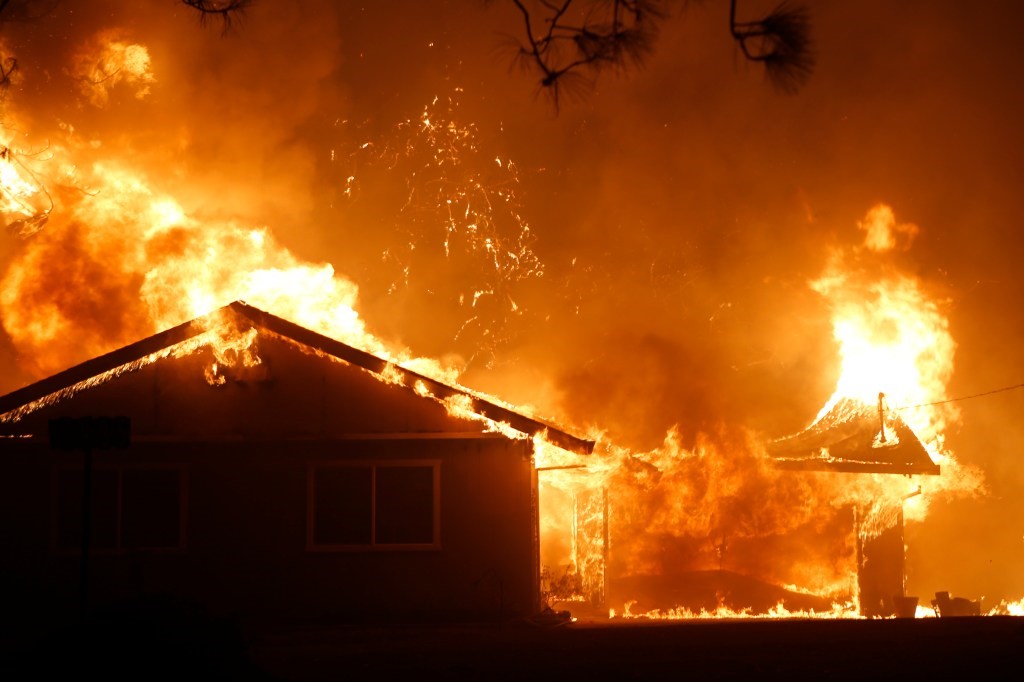
Homes burn on Neal Road in Paradise, Calif., as a wildfire destroys neighborhoods, Thursday, Nov. 8, 2018. Karl Mondon/Bay Area News Group)
By Amy Kalish
PUBLISHED: August 1, 2024 at 2:46 p.m.
Our state Legislature’s quest to remove any inhibitors to housing, no matter how impactful, has taken a new and dangerous form.
With Senate Bill 610, Sen. Scott Wiener (D-San Francisco) shows he is not content to merely wrest zoning control from cities. He is now targeting fire hazard severity zone maps as “impediments” to housing.
Wiener introduced SB 610 as a “gut and amend” bill — the contents were completely changed after it had passed the Senate in an unrelated, innocuous form — giving the Legislature no time to digest SB 610 or its ramifications. The bill not only removes local authority to identify fire hazards, it eliminates the state’s severity-zone maps, and with them terms like “ember resistant zones.” Wiener’s new system would instead declare portions of the state a homogeneous “wildfire mitigation area” with no maps showing the changes.
Wiener bluntly states his suspicions that cities might use hazard maps to cheat their way out of “fair share” housing. Without acknowledging that hazards are real — threatening property and lives — he wants to ditch a functioning system to ensure cities and counties can be forced to allow development in previously identified fire hazard zones.
Recognizing SB 610’s threat, the Center for Biological Diversity distilled their concerns into a letter, and organized a statewide sign-on effort. Within a couple of days — while the Park Fire near Chico exploded into one of California’s largest wildfires ever — 90 organizations signed on.
The letter is addressed to all state leaders. It says, in part, that it “will fundamentally reshape California fire and housing policy and make Californians more vulnerable to wildfire. The bill would completely abolish the Fire Hazard Severity Zone maps that guide mitigation strategies and land use planning for development in fire-risk areas.
“The bill would also centralize all decision making in the hands of just one person: the State Fire Marshal. SB 610’s stated intent is to increase development in high-risk areas, and – quite shockingly – do so without existing regulations designed to protect communities.
“The bill’s fact sheet inappropriately dismisses such regulations as ‘costly building standards, increased disaster planning and mitigation requirements.’ This proposal is directly at odds with the recommendations of the Governor’s Strike Force, which urged the state to ‘deprioritize new development in areas of the most extreme fire risk. … In turn, more urban … regions in the state must prioritize … development and overall housing production.’”
A wet winter’s fuel, dried out in early summer, has kickstarted a catastrophic fire season well before our hottest months. Coupled with increasing risk of explosive fire are many inadequate, incurable evacuation routes. The state should pay attention to science and the insurance industry: some areas are destined to burn.
The traumatized town of Paradise, which received an evacuation warning from the Park Fire, struggled for six years to replace 14,000 burned homes, coming up with about 2,400 so far. Regardless, Paradise is required to produce 7,179 new units by 2030 or face steep penalties.
Wiener’s bill trivializes legitimate, life-threatening concerns. Local elected leaders should retain authority to designate fire zones within their jurisdictions; the maps are a critical tool in wildfire risk reduction, and are doing their job. Our laws should focus on protecting public safety, not preventing it.
Those who say California has a housing crisis “at all levels” have been proven wrong. There’s plenty of expensive housing. Affordably priced housing, left to the private market, doesn’t exist because it’s not profitable. Instead of creating rational policy to produce affordable housing, sited where it can be safely accommodated, the state clings to its “one size fits all” “fair share” housing mandates that require every locality to grow by 15%, regardless of local conditions.
California’s punitive housing policy is failing, yet the state still requires housing where it is unsafe and unwise. In many areas — like Marin — the sheer quantity mandated means it cannot be safely sited. SB 610 only increases our risks.
As the coalition letter from the Center for Biological Diversity urges, the state should “table this bill until next year and instead engage with stakeholders on improving the state’s fire and housing policies.”
Amy Kalish, of Mill Valley, is director of CitizenMarin.org.

